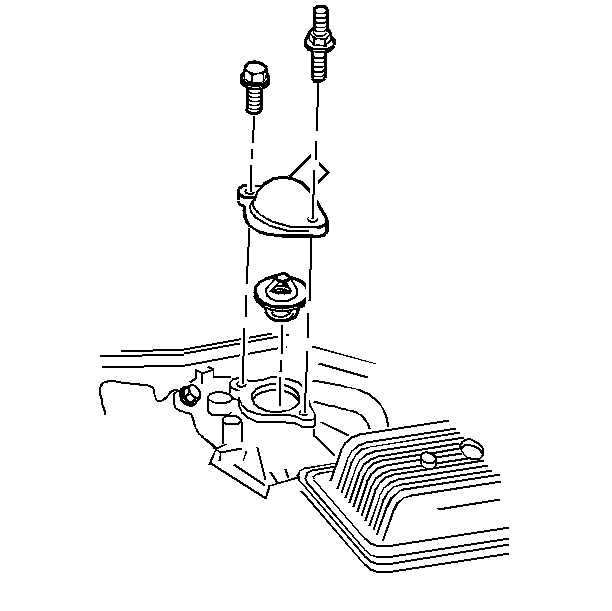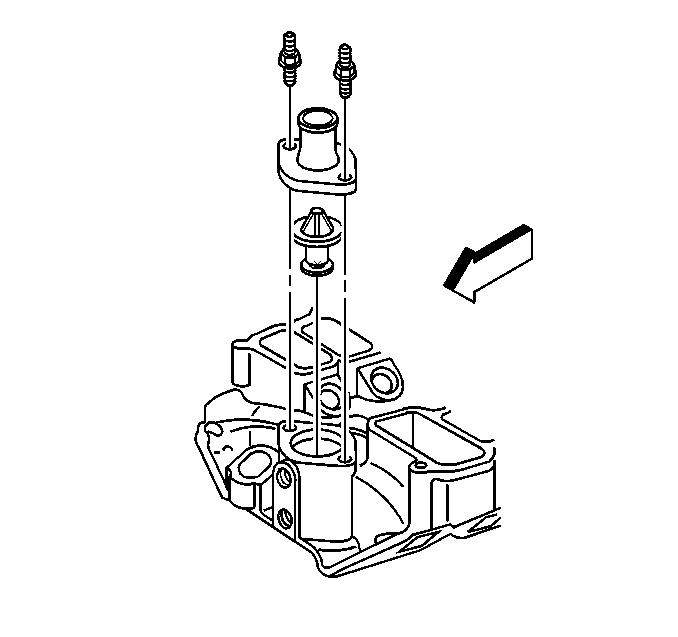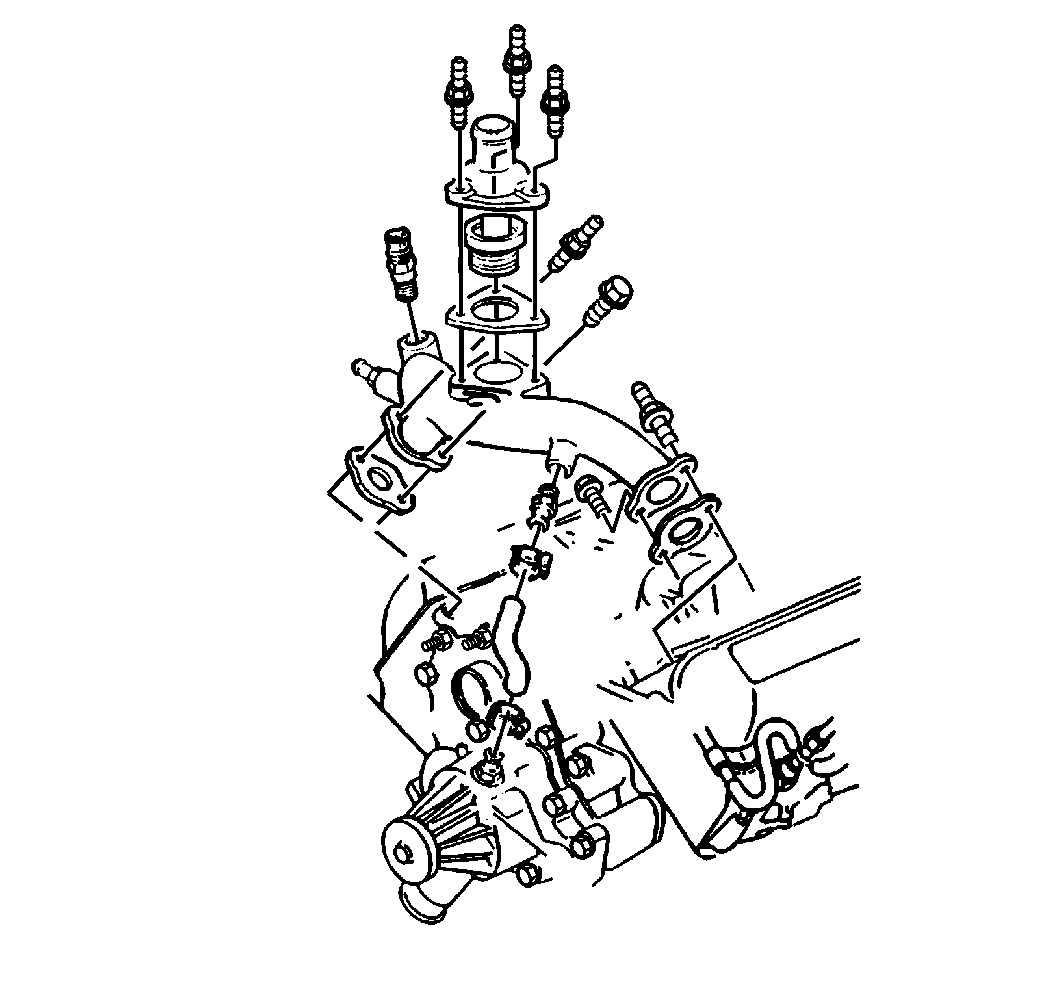Engine Coolant Thermostat Replacement 4.3L
Removal Procedure
- Disconnect the negative battery cable.
- Drain the cooling system until the radiator coolant level is below the thermostat. Refer to Cooling System Draining and Filling .
- Remove the upper radiator hose at the coolant outlet.
- Remove the bolts or the studs. Remove the ground wire to the coolant outlet if equipped .
- Remove the thermostat from the thermostat housing.
- Remove the gasket.
- Inspect the thermostat housing. Inspect the coolant outlet sealing surfaces. Clean the housing and the surfaces.
Caution: Unless directed otherwise, the ignition and start switch must be in the OFF or LOCK position, and all electrical loads must be OFF before servicing any electrical component. Disconnect the negative battery cable to prevent an electrical spark should a tool or equipment come in contact with an exposed electrical terminal. Failure to follow these precautions may result in personal injury and/or damage to the vehicle or its components.
Installation Procedure
- Install the thermostat into the thermostat housing.
- Place the new gasket into position.
- Install the coolant outlet.
- Install the bolts or the studs. Install the ground wire if equipped.
- Connect the radiator hose to the coolant outlet.
- Fill the cooling system. Refer to Cooling System Draining and Filling .
- Start the engine. Run the engine with the radiator cap removed until the radiator is hot and the thermostat is open.
- Add coolant to the radiator while the engine is idling. Add the coolant until the coolant level reaches the bottom of the filler neck.
- Connect the radiator cap to the radiator. Ensure that the arrows line up with the overflow tube.
- Connect the negative battery cable.
Notice: Use the correct fastener in the correct location. Replacement fasteners must be the correct part number for that application. Fasteners requiring replacement or fasteners requiring the use of thread locking compound or sealant are identified in the service procedure. Do not use paints, lubricants, or corrosion inhibitors on fasteners or fastener joint surfaces unless specified. These coatings affect fastener torque and joint clamping force and may damage the fastener. Use the correct tightening sequence and specifications when installing fasteners in order to avoid damage to parts and systems.
Tighten
Tighten the bolts or the studs to 28 N·m (21 lb ft).
Engine Coolant Thermostat Replacement 5.7L
Removal Procedure
- Disconnect the negative battery cable.
- Drain the cooling system until the radiator coolant level is below the thermostat. Refer to Cooling System Draining and Filling .
- Remove the upper radiator hose at the coolant outlet.
- Remove the bolt and the stud. Remove the ground wire to the coolant outlet if equipped.
- Remove the thermostat from the thermostat housing.
- Remove the gasket.
- Inspect the thermostat housing. Inspect the coolant outlet sealing surfaces. Clean the housing and the surfaces.
Caution: Unless directed otherwise, the ignition and start switch must be in the OFF or LOCK position, and all electrical loads must be OFF before servicing any electrical component. Disconnect the negative battery cable to prevent an electrical spark should a tool or equipment come in contact with an exposed electrical terminal. Failure to follow these precautions may result in personal injury and/or damage to the vehicle or its components.

Installation Procedure
- Install the thermostat into the thermostat housing.
- Place the new gasket into position.
- Install the coolant outlet.
- Install the bolts or the studs. Install the ground wire if equipped.
- Connect the radiator hose to the coolant outlet.
- Fill the cooling system. Refer to Cooling System Draining and Filling .
- Start the engine. Run the engine with the radiator cap removed until the radiator is hot and the thermostat is open.
- Add coolant to the radiator while the engine is idling. Add the coolant until the coolant level reaches the bottom of the filler neck.
- Connect the radiator cap to the radiator. Ensure that the arrows line up with the overflow tube.
- Connect the negative battery cable.

Notice: Use the correct fastener in the correct location. Replacement fasteners must be the correct part number for that application. Fasteners requiring replacement or fasteners requiring the use of thread locking compound or sealant are identified in the service procedure. Do not use paints, lubricants, or corrosion inhibitors on fasteners or fastener joint surfaces unless specified. These coatings affect fastener torque and joint clamping force and may damage the fastener. Use the correct tightening sequence and specifications when installing fasteners in order to avoid damage to parts and systems.
Tighten
Tighten the bolts or the studs to 28 N·m (21 lb ft).
Engine Coolant Thermostat Replacement 7.4L
Removal Procedure
- Disconnect the negative battery cable.
- Drain the cooling system until the radiator coolant level is below the thermostat. Refer to Cooling System Draining and Filling .
- Remove the upper radiator hose at the coolant outlet.
- Remove the bolt and the stud. Remove the ground wire to the coolant outlet if equipped.
- Remove the thermostat from the thermostat housing.
- Remove the gasket.
- Inspect the thermostat housing. Inspect the coolant outlet sealing surfaces. Clean the housing and the surfaces.
Caution: Unless directed otherwise, the ignition and start switch must be in the OFF or LOCK position, and all electrical loads must be OFF before servicing any electrical component. Disconnect the negative battery cable to prevent an electrical spark should a tool or equipment come in contact with an exposed electrical terminal. Failure to follow these precautions may result in personal injury and/or damage to the vehicle or its components.

Installation Procedure
- Install the thermostat into the thermostat housing.
- Place the new gasket into position.
- Install the coolant outlet.
- Install the bolts or the studs. Install the ground wire if equipped.
- Connect the radiator hose to the coolant outlet.
- Fill the cooling system. Refer to Cooling System Draining and Filling .
- Start the engine. Run the engine with the radiator cap removed until the radiator is hot and the thermostat is open.
- Add coolant to the radiator while the engine is idling. Add the coolant until the coolant level reaches the bottom of the filler neck.
- Connect the radiator cap to the radiator. Ensure that the arrows line up with the overflow tube.
- Connect the negative battery cable.

Notice: Use the correct fastener in the correct location. Replacement fasteners must be the correct part number for that application. Fasteners requiring replacement or fasteners requiring the use of thread locking compound or sealant are identified in the service procedure. Do not use paints, lubricants, or corrosion inhibitors on fasteners or fastener joint surfaces unless specified. These coatings affect fastener torque and joint clamping force and may damage the fastener. Use the correct tightening sequence and specifications when installing fasteners in order to avoid damage to parts and systems.
Tighten
Tighten the bolt and the stud to 37 N·m (27 lb ft).
Engine Coolant Thermostat Replacement 6.5L
Removal Procedure
Notice: Diesel Engines use a non-blocking style thermostat. If a blocking style thermostat is used in its place, the engine will overheat. A blocking style thermostat can be identified by a spring and a plate on the back side of the thermostat. When a thermostat opens, the spring moves the plate so that it blocks the coolant flow from entering the coolant bypass.
- Disconnect the negative battery cable.
- Drain the cooling system until the radiator coolant level is below the thermostat. Refer to Cooling System Draining and Filling
- Remove the engine oil indicator tube brace. Remove the oil fill brace. Refer to Oil Level Indicator and Tube Replacement in Engine Mechanical.
- Remove the bolts or the studs. Remove the coolant outlet.
- Disconnect the upper radiator inlet hose.
- Remove the thermostat from the thermostat housing.
- Remove the gasket.
- Inspect the thermostat housing and the coolant outlet sealing surfaces. Ensure that the housing and the surfaces are clean.
Caution: Unless directed otherwise, the ignition and start switch must be in the OFF or LOCK position, and all electrical loads must be OFF before servicing any electrical component. Disconnect the negative battery cable to prevent an electrical spark should a tool or equipment come in contact with an exposed electrical terminal. Failure to follow these precautions may result in personal injury and/or damage to the vehicle or its components.

Installation Procedure
- Install the thermostat in the thermostat housing.
- Place the gasket into position.
- Install the coolant outlet.
- Install the bolts or the studs. Install the upper radiator inlet hose.
- Install the engine oil indicator tube brace. Install the oil fill brace. Refer to Oil Level Indicator and Tube Replacement
- Fill the cooling system. Refer to Cooling System Draining and Filling
- Start the engine. Remove the radiator cap and allow the engine to run until the upper hose is hot and the thermostat is open.
- Add coolant to the radiator while the engine is idling. Add the coolant until the coolant level reaches the bottom of the filler neck.

Notice: Use the correct fastener in the correct location. Replacement fasteners must be the correct part number for that application. Fasteners requiring replacement or fasteners requiring the use of thread locking compound or sealant are identified in the service procedure. Do not use paints, lubricants, or corrosion inhibitors on fasteners or fastener joint surfaces unless specified. These coatings affect fastener torque and joint clamping force and may damage the fastener. Use the correct tightening sequence and specifications when installing fasteners in order to avoid damage to parts and systems.
Tighten
Tighten the bolts or the studs to 47 N·m (35 lb ft).
